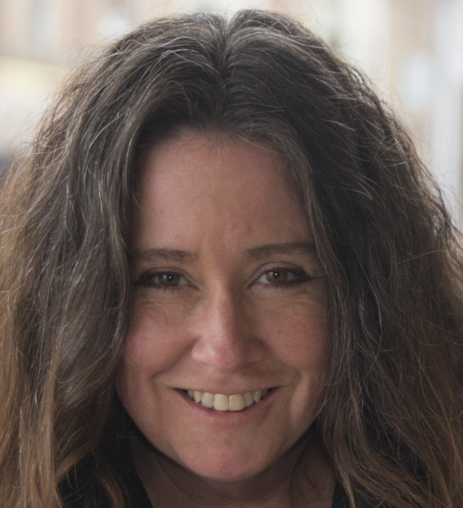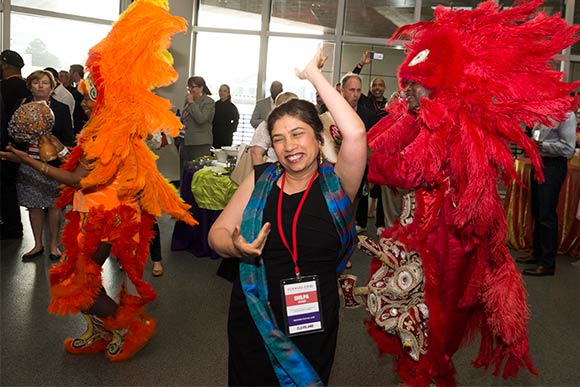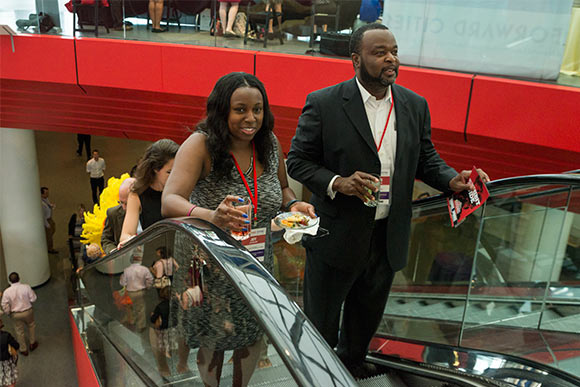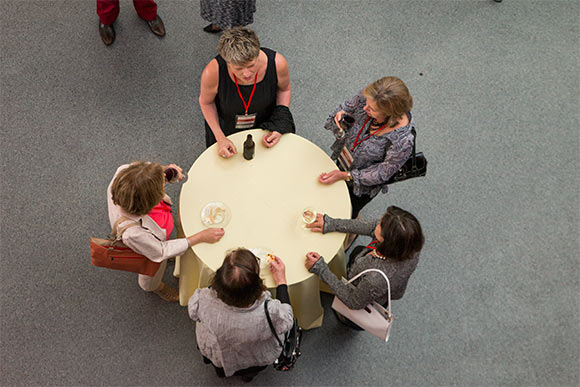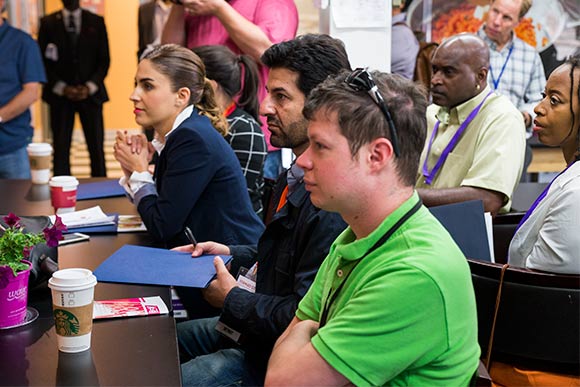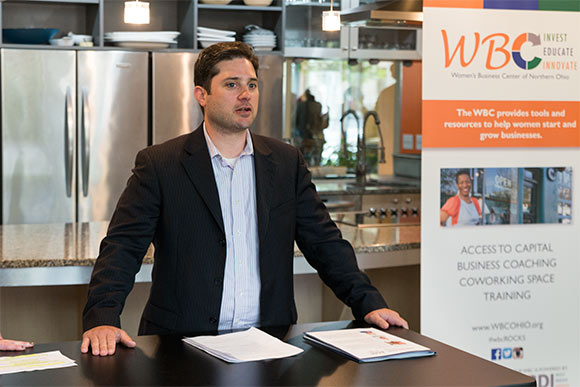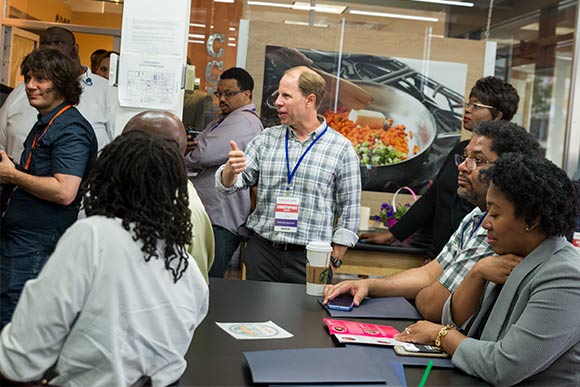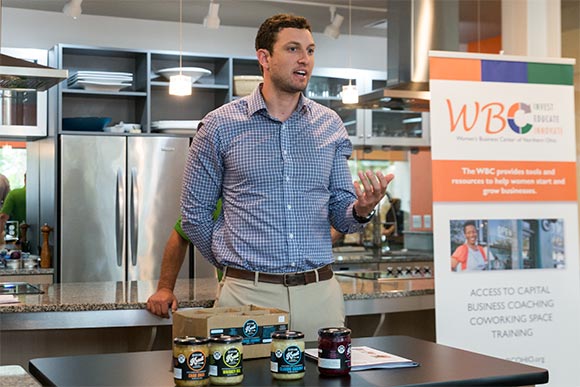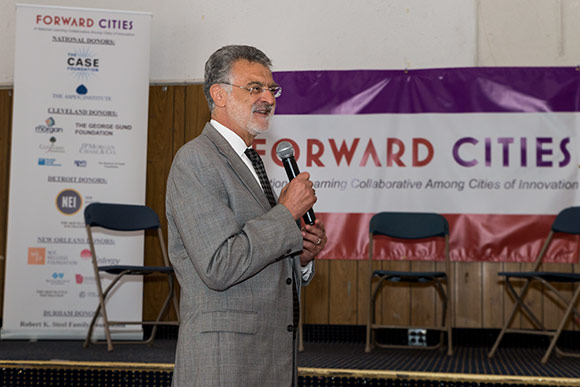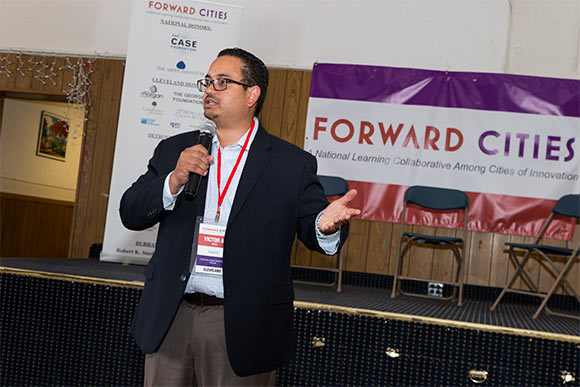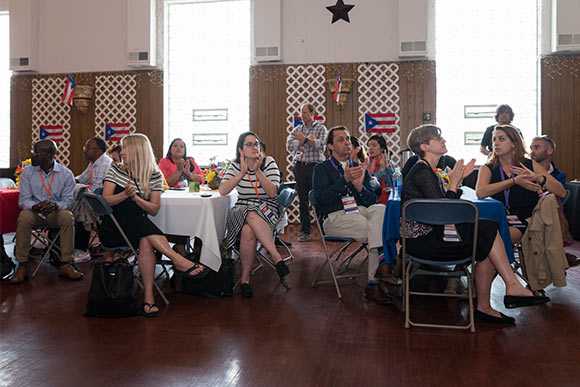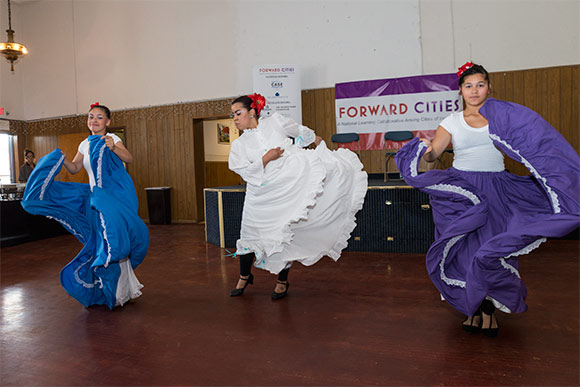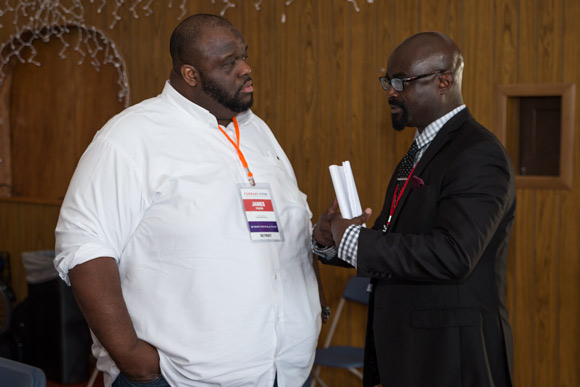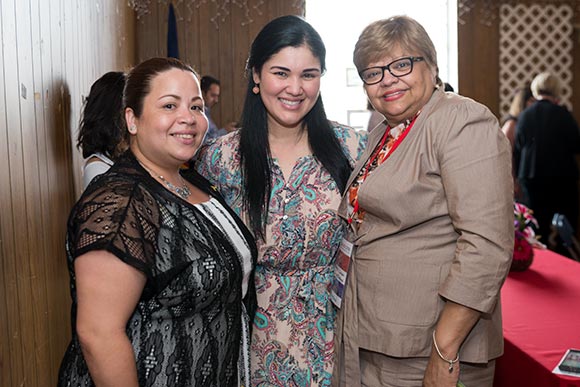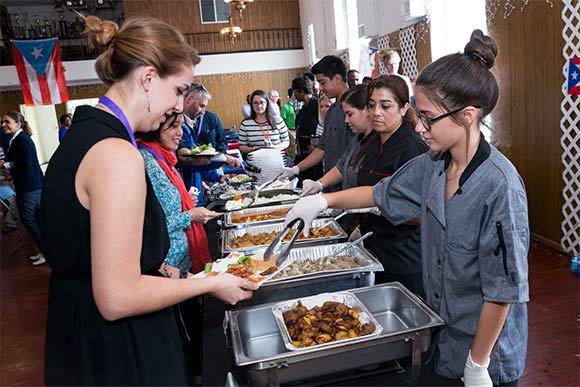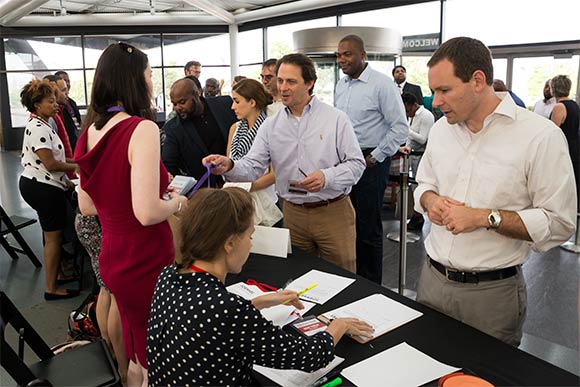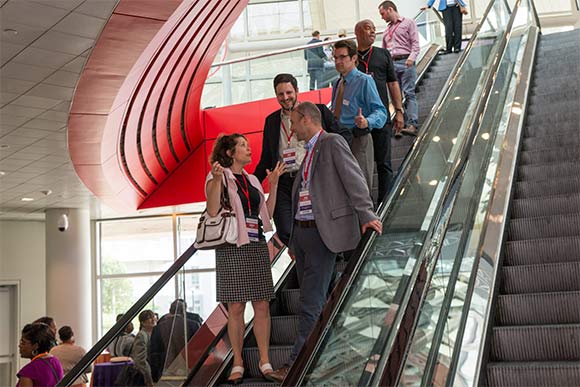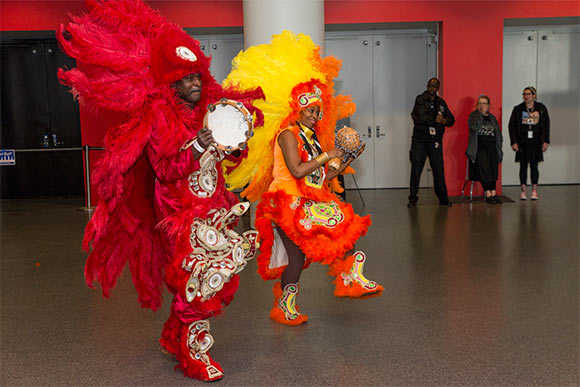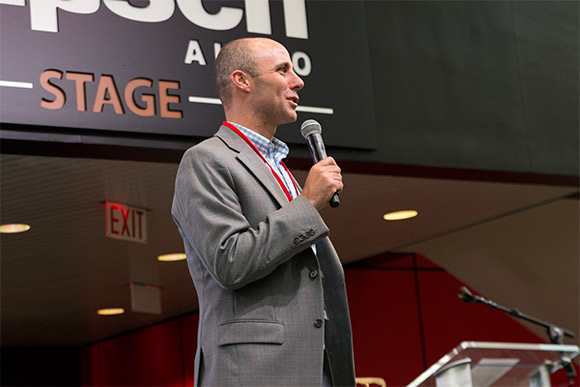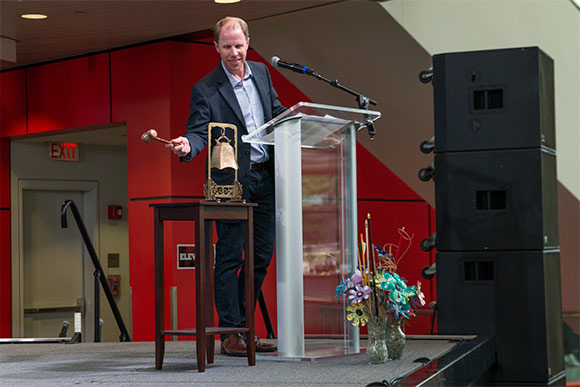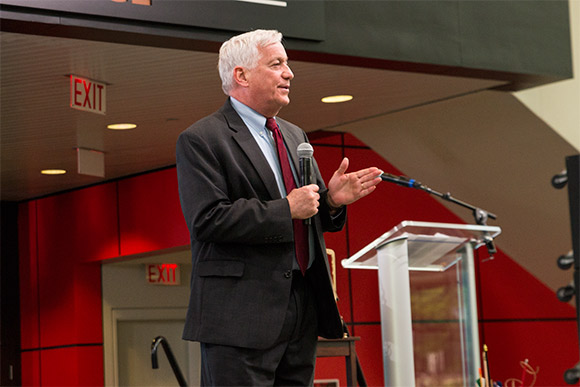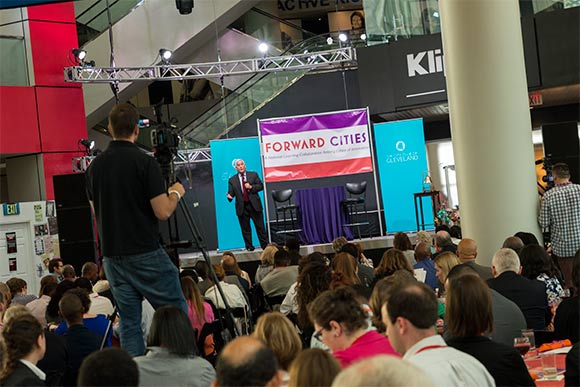Forward Cities convenes in Cleveland
Last week in points across Cleveland, the national learning collaborative Forward Cities culminated two years of work fostering entrepreneurship and social innovation in minority communities. The four-day convening included an array of business, policy and foundation leaders from four American cities undergoing profound transformation and rebirth. The other participating cities included New Orleans, Detroit and Durham, which hosted similar events in December 2014, June 2015 and December 2015, respectively.
Cleveland's successful and emerging neighborhoods took center stage for the event, which included approximately 200 attendees.
Feet on the Street
In order to see our neighborhood achievements first hand, the group embarked on a number of field trips that included:
- Cleveland's Health Tech Corridor, a strategically located project that aims to create a community for high-tech and biotech companies, technology startups and investors.
- Cleveland Culinary Launch Kitchen (CCLK) where representatives of the CCLK, the Cleveland Economic and Community Development Institute (ECDI) and Bad Girl Ventures spoke. See the Spotlight below.
- JumpStart, which offers assistance, mentoring and talent and scaleup services with a focus on Cleveland's underserved areas. Jumpstart's portfolio includes the bright Studio Stick venture, which is part of its Core City program.
- PNC Fairfax Connection, the free community center that empowers neighborhood residents with programming and by strengthening connections to assets across the area.
- The Vineyards of Chateaux Hough, where the group met owner and urban vintner. Mansfield Frazier.
- The St. Clair Superior neighborhood, where stops included the eye-popping Asia Town, the Urban Sheep Grazing Program, UpCycle Parts Shop and Hub 55, a growing district centered on artisans, makers and food/beverage entrepreneurs.
Other stops included a tour of East 105th Street, which is part of the Opportunity Corridor Project; the Evergreen Cooperatives and partner venture, the Bridgeport Café; Rid-All Urban Farm, wherein urban agriculture and youth education are the focus; and the enduring Ohio City neighborhood including the energetic West 25th Street corridor, the Refugee Response organization and Ohio City Farm.
Spotlight: What's Cooking in Cleveland?
The Forward Cities Contingent kicked off last Wednesday's proceedings bright and early at the Cleveland Culinary Launch Kitchen (CCLK), a professional shared kitchen and food business incubator that boasts 55 members who use the 3,500-square-foot facility 24 hours a day. The group also learned about the new Women's Business Center (WBC) of Northern Ohio and Bad Girl Ventures (BGV), a high-powered entrepreneurial training program for women
Greg Zucca, vice president of lending for ECDI, said the statewide organization, which was founded in 2004, is the third largest SBA micro intermediary lender in the country, and has also been designated as a Community Development Financial Institution by the U.S. Treasury Department. It has transacted $30 million in lending amid 1,500 small Ohio businesses since its inception.
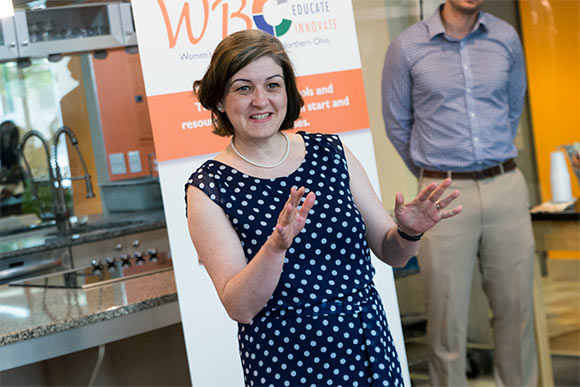 Reka Barabas, director of BGV Cleveland.
Reka Barabas, director of BGV Cleveland.
The Cleveland office opened in 2012. Since then, ECDI has lent nearly $6 million to 233 Northeast Ohio businesses and created 500 jobs
"Just this last year alone - which has been our largest year," said Zucca, "we've done about $1.6 million in lending."
ECDI works with an array of entrepreneurs, including a number of immigrants and refugees. The Cleveland branch has aided close to 20 such clients including Kafaya Mohamed of Kafaya's Kitchen, which features Somalian take-out food; Mariela Paz of Sabor Miami Café, Juan Vergara Martinez of Barroco Grill, Siba Beavogui of Kolou's Marketplace, Dagmara Ragone of Dancing Divas Wear and a host of others.
"We're working with those businesses and entrepreneurs that are unable to get traditional bank financing," said Zucca. "Because of that, we partner with financial institutions throughout the region. We don't compete with them."
Forward Cities attendees had an opportunity to hear the stories of two ECDI clients.
Drew Anderson of Cleveland Kraut launched his business with his brother-in-law in 2013 in order to carry on the Cleveland Eastern European food traditions they both love. The duo started at the CCLK and now boasts their own production facility and staff.
"We're in eight states and we ship across the nation via the web," said Anderson.
Pedro Quintana, founder and president of Quintana & Sons Inc., discussed how his construction business grew with the help of ECDI.
"I came to the United States as a political refugee," said Quintana of his move from Chili more than 30 years ago. He subsequently launched a modest construction business, which now garners an annual revenue of $1 million. He credits the growth in part to ECDI.
"They worked with us and looked at us differently than a regular bank," he said, adding that the growth of his company is such that he hopes to reach a revenue of $2 million this year.
"We're growing so fast," said Quintana, "a little bit of concern comes to my mind."
ECDI is also a strong advocate for women entrepreneurs. To that end, the organization launched the Northern Ohio WBC last year.
"The United States is in the middle of a women's business boom," said Carrie Rosenfelt, executive director of the Northern Ohio WBC. "Thirty-eight percent of all businesses in the U. S. are owned by women," she said, adding that more than 1,000 businesses are started every day by women. "And women of color are the fastest growing group of entrepreneurs in the U. S."
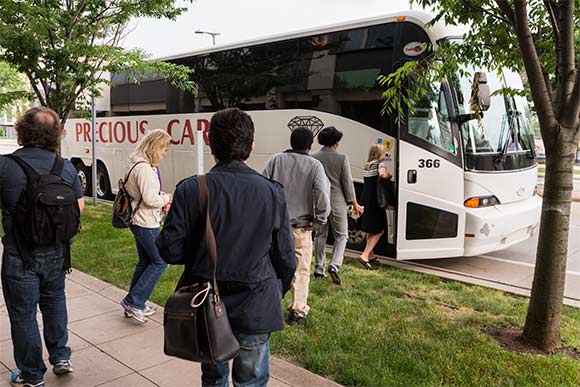 Forward Cities Cleveland Convening boarding the bus to the next stop
Forward Cities Cleveland Convening boarding the bus to the next stop
In response to that growth, the Small Business Administration has established a national network of 109 WBCs, said Rosenfelt to the group, adding that there are WBCs in each of the Forward Cities.
"We serve all women," she said, "but we focus on historically underserved populations such as low income, minority, immigrant and refugee women."
The Center's goal is to "invest, educate and innovate," said Rosenfelt, adding that, similar to ECDI, the organization focuses on micro-enterprise lending, with loans ranging from $500 to $350,000. Since October 2015, the Center has created 24 jobs and accessed nearly $450,000 in capital.
"They've use that for everything from buying a computer to run their business to buying a truck," she said of her organization's clients.
ECDI also partners with Bad Girl Ventures, which is another educational and micro-finance non-profit that focuses on women entrepreneurs by offering a nine-week education program each year. The top 10 finalists from each cohort compete to win a low-interest business loan up to $25,000.
Some of BGV's successful graduates include Jennifer Henry of Relevation, a physical therapy studio; Jillian Davis, owner of the popular eatery Toast; and Nicole McGee, founder of Upcycle Parts Shop.
"The mission of Bad Girl Ventures is to make sure that women have access to capital when they are ready," said Reka Barabas, director of BGV Cleveland. "We want to make sure they are fundable." She adds that clients enjoy the structure of the programming and the networking opportunities, which foster community.
However, Barabas likes to quantify success in terms other than customer satisfaction.
"We gave $225,000 in past five years," she said. "Our graduates attracted an additional $800,000 in follow up funding, which is great."
Lending an ear: from Cleveland's Hispanic Chamber of Commerce to 10,000 small businesses
The group enjoyed lunch on Wednesday at the San Lorenzo Social Club in the Clark Fulton neighborhood, which is an area poised for transformation as efforts such as the monthly Hispanic themed market, La Placita, gain traction. Speakers included Elizabeth Allen, senior vice president of external affairs for the neighborhood anchor MetroHealth; Jenice Contreras, executive director of the Hispanic Chamber of Commerce; and local business owner Alexandra Pagan.
Other speakers over the multi-day event included Cleveland historian, Dr. John Grabowski, who presented a history of Cleveland and its neighborhoods at the Federal Reserve Bank downtown and Goldman Sachs representatives, who talked about that organization's 10,000 Small Businesses program at the Happy Dog in one of this comeback city's best comeback neighborhoods - the Gordon Arts District in Detroit Shoreway. LaRese Purnell discussed Black Friday; Walter Isaacson, president/CEO of the Aspen Institute delivered Thursday night's keynote and Kathy Petit, senior research associate at the Urban Institute, discussed that organization's efforts. Regional administrator Marianne Markowitz of the U. S. Small Business Administration, gave advice towards the end of the convening Friday.
Panel discussions included "Globalization and Immigration as a Strategy for Urban Renewal," which was moderated by Peter A. Reiling, executive vice president of the Aspen Institute. Jennifer Bradley, director of the Aspen Institute's Center for Urban Innovation, moderated the "Anchor Strategies 2.0: Inclusive Economic Development Successes & Challenges" panel.
Spotlight Panel: Role of Individual Entrepreneurs/Innovators in a City's Comeback
Jean Claude Brizard, Aspen Institute Pahara Fellow and vice president at Cross & Joftus, moderated this panel, which included Evelyn Burnett, vice president of Cleveland Neighborhood Progress; Lisa Johanon, executive director of the Central Detroit Christian Community CDC; John Thompson, founder of the Resurrection After Exoneration movement, New Orleans and Ed Boyd, founder of Invictus Office Center in Durham.
Highlights from the session included the following:
Thompson: "I spent 18 years on death row for a crime I did not commit. When I came home there was nothing for exonerees. There were more programs for convicted felons," he said, noting that he readily – and luckily – accessed legal support. Habitat for humanity also built him a home. "I was one of the fortunate ones; my transition was beautiful with a lot of support. My fellow exonerees – there was nothing available for them. No one was looking out for them. It just tore me apart and it just told me I had to make them enjoy the same type of reentry that I was." He went on to found Resurrection After Exoneration, a comprehensive re-entry program for exonerees and other formerly incarcerated individuals.
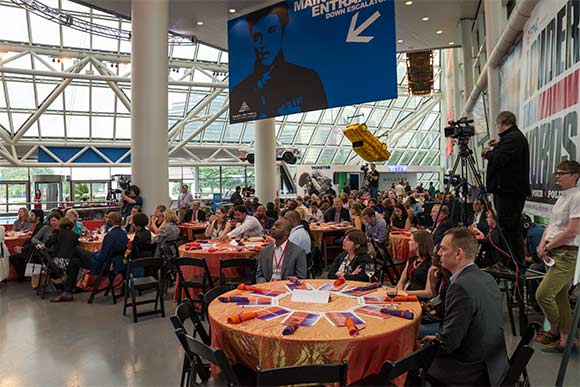 Forward Cities reception and dinner at Rock and Roll Hall of Fame
Forward Cities reception and dinner at Rock and Roll Hall of Fame
Boyd referenced a survey that focused on high-growth, scalable businesses: "Ninety percent of those founders originally came from lower middle class and upper lower class backgrounds. I think it's important that we understand that. I think the stories are often told or the models are often created that entrepreneurship is something designed for those that have extra. I don't think that's the case at all."
Johanon: "I think that Detroit more than probably any other city in the nation has had to reconfigure its economy and how people make money," she said, noting that the transformation of the auto industry and the city's struggles have left opportunity in their wake. "It's been a fertile ground for entrepreneurs to be able to take root and to be creative."
Burnett: "We're a country built on entrepreneurism. I think that's what's important about this conversation over the last two years – who we see as entrepreneurs and what we define as innovation. I think a lot of us are lobbying and advocating for us to take an innovative look at innovation and take another look at entrepreneurship, particularly who does it and how do they do it – and how do we support them to do it."
"We Cannot Lose This."
Deborah Hoover, co-founder of Forward Cities and CEO of the Burton D. Morgan Foundation noted the following in her closing remarks: "We've engaged in some very hardcore strategic planning to look at ourselves as a region, to figure out how we can come together. It can't just be about Cleveland or Akron or Youngstown. We all have to be working together," she said, noting that growth of minority businesses play a pivotal role in the area's success and that there is much work ahead in fostering those opportunities.
"We get a mixed score card for how we've done. It's been a struggle and we can definitely do it better – and I think we will be able to do it better because of what we've learned through Forward Cities. We have peeled the onion back and we've gotten into some conversations that we haven't had in our region before. That's been for me – and I think for my colleagues – one of the most valuable things about Forward Cities.
"We can now talk about these things in ways we were not able to before. We cannot lose this. We must remember what we learned here."
Fresh Water's parent company, Issue Media Group, is a national partner in the Forward Cities initiative.
The Economic and Community Development Institute is part of Fresh Water's underwriting network.
